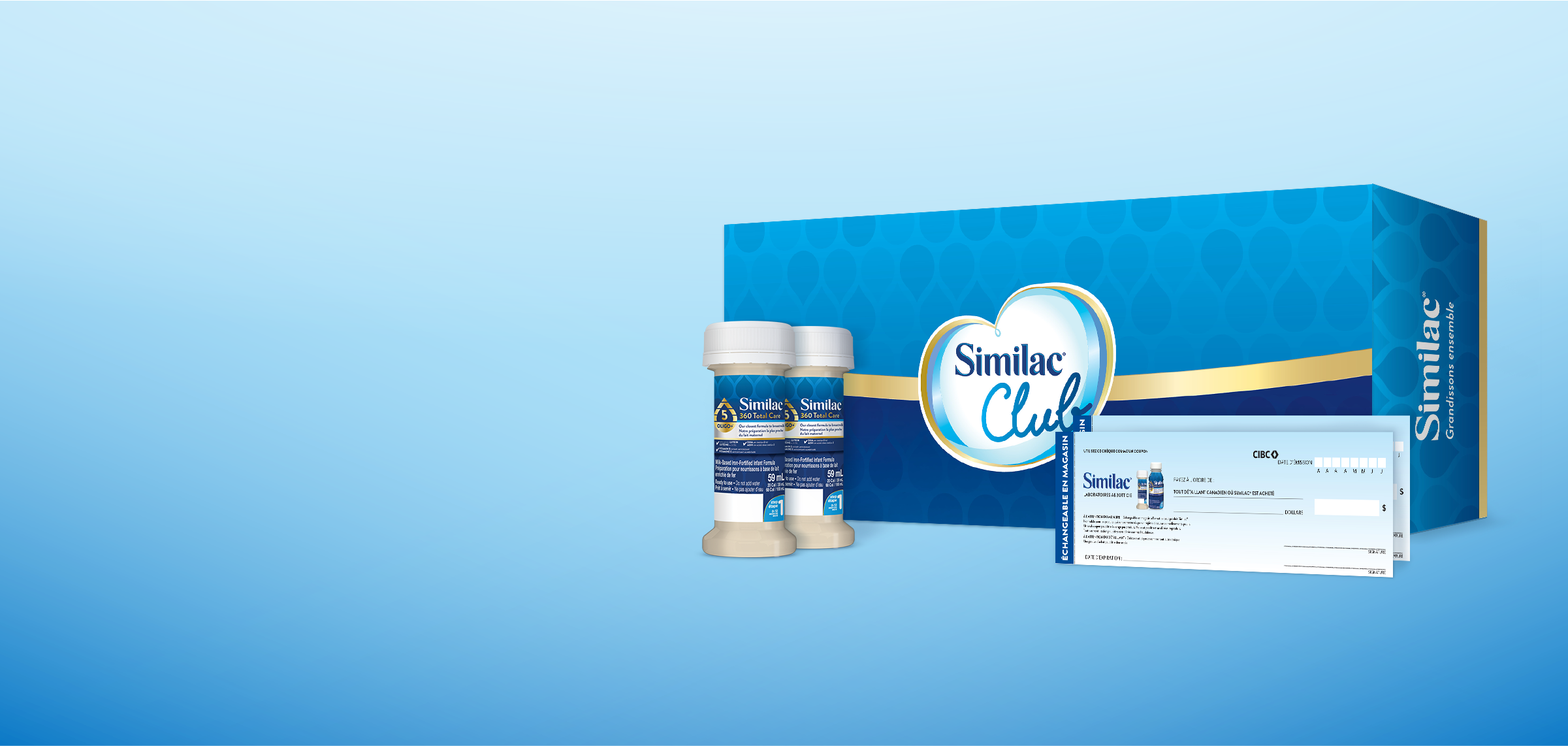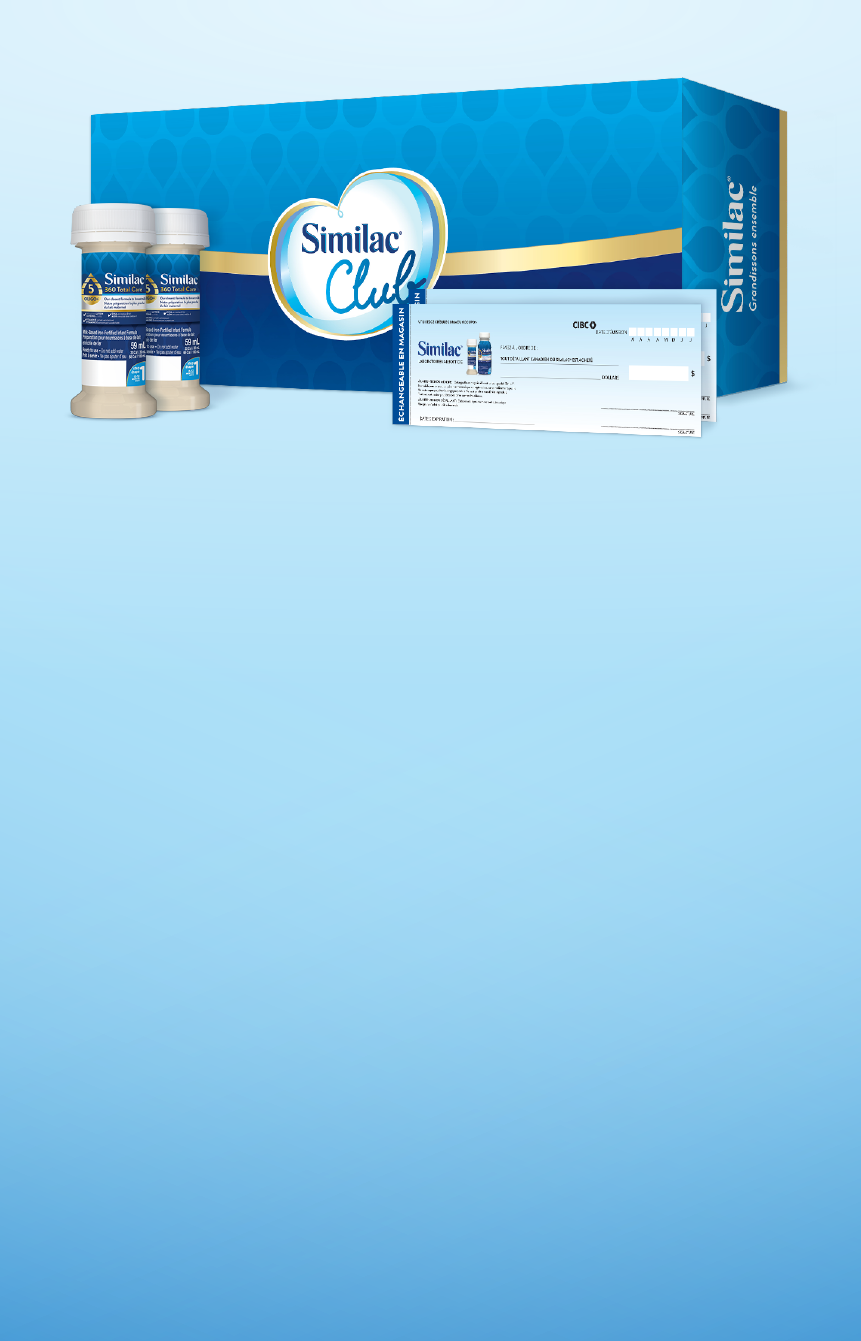Have a question about Similac® products? Perhaps the answer is just below! If your question is not answered here, please contact us.
FAQ
Features of Similac® products
Is Similac® gluten-free?
Is Similac® halal?
Our Similac® formulas are halal, with the exception of Similac® Alimentum®. Many of Abbott's other nutritional products, such as PediaSure Complete®, most of our Ensure® products, and Glucerna® nutritional drinks, are also halal.
Is Similac® kosher?
Our Similac® baby formulas are kosher, with the exception of Similac® Alimentum®. Many of Abbott's other nutritional products, such as PediaSure Complete®, most of our Ensure® products, and Glucerna® nutritional drinks, are also kosher.
Is Similac® Alimentum® covered by insurance plans?
Similac® Alimentum® in the ready-to-use format is covered by most provincial programs or private insurance plans. At this time, the powder format is not included in this coverage. For more information, please speak to your pharmacist or health care professional.
Is Similac® Neosure® covered by insurance plans?
Similac® Neosure® in the ready-to-use format is covered by most provincial programs or private insurance plans. At this time, the powder format is not included in this coverage. For more information, please speak to your pharmacist or health care professional.
Are there Similac® coupons available?
If you register to the Similac® Club, you will get up to $300 in coupons and bonuses.
Do Abbott infant formulas contain palm olein oil or palm oil?
- Abbott’s Step 1 and Step 2 infant formulas do not contain palm olein oil or palm oil, with the exception of Similac® Alimentum®.†
- While palm olein oil is included in some infant formulas to mimic the palmitic acid found in breast milk, some research has shown that this ingredient may contribute to harder stools.1,2
1. Bronsky J et al. J Pediatr Gastroenterol Nutr 2019;68(5):742-60.
2. Leite ME et al. BMC Pediatr 2013;13:215. Published December 24, 2013.
† Similac® Alimentum® contains palm kernel oil as part of the source of medium chain triglycerides (MCT), an easier-to-digest fat.
Preparation
How can I get the most out of my ready-to-use formula?
When mixing baby formula, do I have to boil the water?
Health Canada recommends boiling water for 2 minutes at a rolling boil and then allowing it to cool before using it to prepare infant formula. Your baby’s health care professional will decide when it is no longer necessary to sterilize water for your baby’s formula.
What temperature should the boiled water cool down to before it can be used to prepare baby formula?
Water should be allowed to cool to room temperature before being mixed with the baby formula. Always check the temperature of the baby formula by testing a few drops on the inside of your wrist before feeding your baby.
Can I microwave baby formula?
No. Microwaving can cause uneven heating of the formula. This can result in “hot spots” that could burn your baby.
How should I reheat formula that was stored in the fridge?
To warm up formula that has been stored in the fridge, place the bottle in a bottle warmer or a container of warm water for no more than 15 minutes. The longer you warm it, the greater the chances that harmful bacteria might grow. Do not use the microwave to reheat formula. Always check feeding temperature in order to avoid scalding the infant's mouth. Before feeding begins, prepared formula can be kept at room temperature for up to 2 hours and then must be discarded. Once feeding begins, formula must be discarded after 1 hour.
How to prepare baby formula?
Refer to product label for complete preparation instructions.
Your baby’s health depends on carefully following these directions. Wash hands thoroughly with soap and water. Proper hygiene, preparation, mixing, and storage are important when using infant formula. Use as directed by your health care professional.
WARNING: Never use a microwave oven to warm formula; serious burns can result. Test temperature before feeding to avoid scalding the baby’s mouth.
Preparation instructions for powder baby formula – Must add water
Powder infant formulas are not sterile and should not be fed to premature babies or babies who might have immune system problems unless directed by your health care professional.
ADD WATER
- Place washed bottles, nipples, rings, caps, and all preparation equipment in boiling water and keep at a rolling boil for 2 minutes. In another pot, boil water at a rolling boil for 2 minutes. Cool to room temperature prior to mixing.
- Pour desired amount of boiled, cooled water into bottle.
- Using enclosed scoop, add 1 unpacked level scoop of powder to each 60 mL of water. Return dry scoop to container.
- Cap bottle; shake well; attach nipple.
Storage: Once mixed, refrigerate bottles immediately; use within 24 hours. Once feeding begins, use within 1 hour or discard.
Preparation instructions for concentrated liquid formula – Must add water
Must add equal amounts of water (boiled and cooled to room temperature) and concentrated liquid formula.
- Place washed bottles, nipples, rings, caps, and all preparation equipment in boiling water and keep at a rolling boil for 2 minutes. In another pot, boil water at a rolling boil for 2 minutes. Cool to room temperature prior to mixing.
- Clean top of can. Shake well before opening. Pour equal amounts of concentrated liquid formula and boiled, cooled water into bottle. (See mixing guide on label.)
- Cap bottle; shake well; attach nipple.
Storage: Cover prepared bottles and opened cans and refrigerate immediately; use within 48 hours. Once feeding begins, use within 1 hour or discard.
Preparation instructions for ready-to-use formula - Do not add water
59-mL plastic bottles:
- Place washed nipple, ring, and cap in boiling water and keep at a rolling boil for 2 minutes.
- SHAKE BOTTLE WELL before opening and twist off cap.
- Attach nipple.
Cans:
- Place washed bottles, nipples, rings, caps, and all preparation equipment in boiling water and keep at a rolling boil for 2 minutes.
- Clean top of can. Shake well before opening. Pour formula into bottle; attach nipple.
Storage: Cover prepared bottles and opened cans and refrigerate immediately; use within 48 hours. Once feeding begins, use within 1 hour or discard.
Storage
What does the date on the end of the can mean?
Can infant formula be frozen?
No. Infant formula should not be frozen either before or after mixing. Prolonged exposure to temperatures below 0°C could affect the physical consistency of the product. In other words, freezing formula may cause it to become grainy or cause the fat to separate.
Once the baby has started drinking from the bottle, can I refrigerate any remaining formula for later use?
We do not recommend that formula be fed again once a baby has nursed from the bottle. During a feeding, the baby's saliva can come in contact with the formula in the bottle. Saliva, combined with the enriched nutrients found in infant formula, can create an excellent breeding ground for microorganisms to grow. Unfortunately, neither refrigeration nor reheating will prevent this growth, so we recommend that any unused baby formula be discarded within 1 hour from the time the baby's mouth first came into contact with the nipple.
How long can I store prepared baby formula?
As a general rule, it is safe to refrigerate prepared baby formula in a sealed container for up to 24 hours. Some prepared baby formulas can be refrigerated for longer than 24 hours if stated on the product label. Always check the specific product label to determine storage conditions and time. Do not exceed the recommended storage times.
What are the storage temperatures for Similac® infant formulas?
Store unopened cans of Similac® infant formulas at room temperature.
Can I store opened cans of baby formula in the refrigerator?
You can store opened cans of ready-to-use or concentrated liquid formula for up to 48 hours in the refrigerator. Be sure to cover the opened can with a tight-fitting lid or aluminum foil.
Do not store cans of powder infant formula in the refrigerator. Instead, store them covered, in a cool, dry place.
References:
Government of Canada. Preparing and Handling Powdered Infant Formula. Date modified: 2011-04-12. Accessed on August 10, 2015 at:https://www.canada.ca/en/health-canada/services/milk-infant-formula/preparing-handling-powdered-infant-formula.html.
World Health Organization. Safe preparation, storage and handling of powdered infant formula. 2007. Accessed on August 10, 2015 at:http://www.who.int/foodsafety/publications/micro/pif_guidelines.pdf. (PDF, 361 KB)



